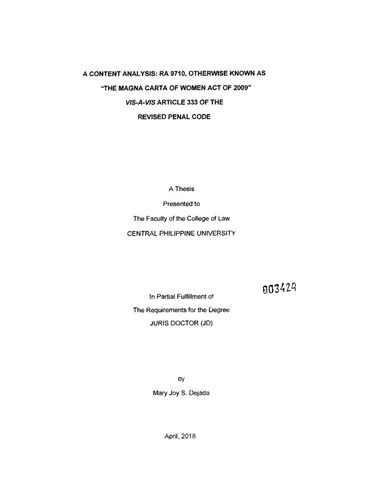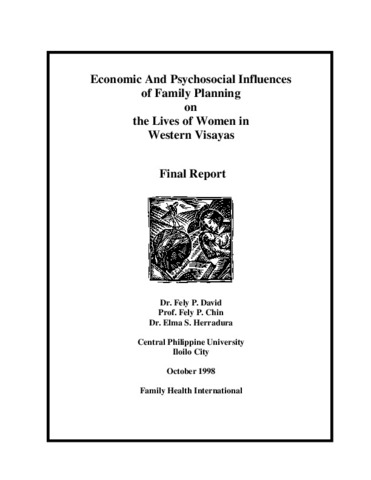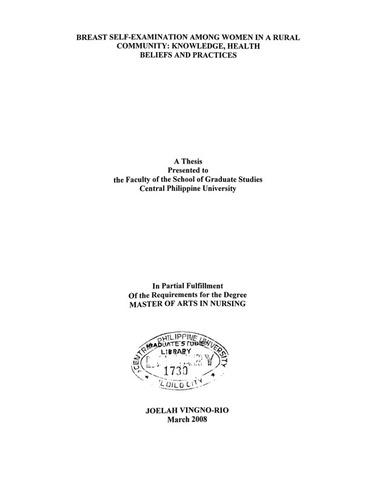A content analysis: RA 9710, otherwise known as “The Magna Carta of Women Act of 2009” vis-à-vis Article 333 of the Revised Penal Code
| dc.contributor.adviser | Alibogha, Salex E. | |
| dc.contributor.author | Dejada, Mary Joy S. | |
| dc.date.accessioned | 2021-06-30T06:29:46Z | |
| dc.date.available | 2021-06-30T06:29:46Z | |
| dc.date.issued | 2018 | |
| dc.identifier.citation | Dejada, M. J. S. (2018). A content analysis: RA 9710, otherwise known as “The Magna Carta of Women Act of 2009” vis-à-vis Article 333 of the Revised Penal Code (Unpublished postgraduate thesis). Central Philippine University, Jaro, Iloilo City. | en_US |
| dc.identifier.uri | https://hdl.handle.net/20.500.12852/1129 | |
| dc.description | Abstract only | en_US |
| dc.description.abstract | A content analysis was conducted to determine the effectiveness of RA 9710, otherwise known as “The Magna Carta of Women Act of 2009” in relation to Article 333 of the Revised Penal Code (RPC). This study sought to determine the local and international laws that protect the rights and welfare of Filipino women against gender discrimination. This study was conducted to provide the lawmakers of the urgency to amend certain provisions of the said laws taking into account the equal protection clause as expressly provided under Section 1 of Article III of the 1987 Constitution. After a comparative study between the provisions of Article 333 (Adultery) and 334 (Concubinage) under the RPC, the results revealed that there are still huge gaps based on the circumstances provided in the commission of the offense and the penalty imposed upon them as to come up with a theory of the existence of gender discrimination and ineffective implication of RA 9710. Philippine Laws, all the more particularly, the adultery and concubinage laws still have build-ups of imbalance and difference. This is the significance involvement of RA 9710, such that the status of men and women and the parts of each in the social arena have been definitely changed for the purpose of harmony in the eyes of the law. | en_US |
| dc.format.extent | vii, 75 leaves | en_US |
| dc.language.iso | en | en_US |
| dc.rights | Attribution-NonCommercial-NoDerivs 3.0 Philippines | * |
| dc.rights.uri | http://creativecommons.org/licenses/by-nc-nd/3.0/ph/ | * |
| dc.subject.ddc | Law Library 340.72 D368 2018 | en_US |
| dc.subject.lcsh | Women | en_US |
| dc.subject.lcsh | Women's rights | en_US |
| dc.subject.lcsh | Sex discrimination against women | en_US |
| dc.subject.lcsh | Sex discrimination | en_US |
| dc.subject.lcsh | Women--Legal status, laws, etc. | en_US |
| dc.subject.lcsh | Sex discrimination against women--Law and legislation | en_US |
| dc.subject.lcsh | Sex discrimination--Law and legislation | en_US |
| dc.subject.lcsh | Criminal law | en_US |
| dc.subject.lcsh | Adultery | en_US |
| dc.subject.lcsh | Adultery--Law and legislation | en_US |
| dc.subject.lcsh | Concubinage | en_US |
| dc.title | A content analysis: RA 9710, otherwise known as “The Magna Carta of Women Act of 2009” vis-à-vis Article 333 of the Revised Penal Code | en_US |
| dc.type | Thesis | en_US |
| dc.description.bibliographicalreferences | Includes bibliographical references | en_US |
| dc.contributor.chair | Bedona, Zacarias D. Jr. | |
| dc.contributor.department | College of Law | en_US |
| dc.description.degree | Juris Doctor | en_US |
| local.subject | RA 9710 | en_US |
| local.subject | Magna Carta of Women Act of 2009 | en_US |
Files in this item
This item appears in the following Collection(s)
-
Juris Doctor [144]






